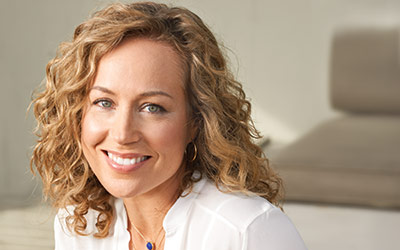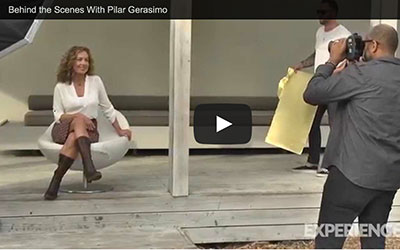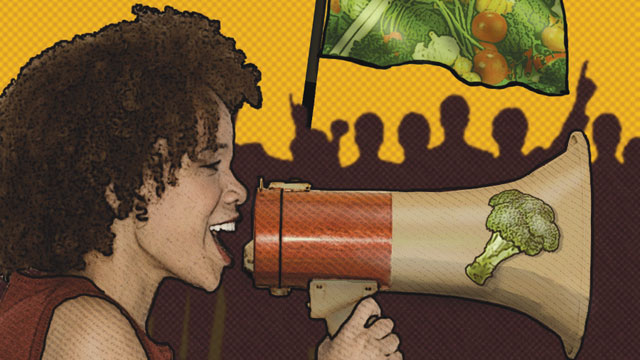When Pilar Gerasimo founded Experience Life back in 2001, she knew she wanted to spark a revolution.
A longtime health seeker, Gerasimo had become bored and disappointed by an endless stream of lookalike fitness magazines, all rehashing the same flat-abs promises and warmed-over diet and workout advice.
So she set out to create a different kind of healthy-living magazine — one that prioritized whole-person well-being over superficial hype. “At the time, it was a pretty revolutionary idea,” she says. “I was blessed to have Life Time as a partner, and to have its CEO, Bahram Akradi, as a champion for the idea, because I’m pretty sure no conventional publisher would have touched it.”
For 13 years, Gerasimo served as the magazine’s editor in chief. During her tenure, EL earned more than 100 editorial and design awards, including a Gold Folio award for Gerasimo’s chapbook — Being Healthy Is a Revolutionary Act: A Manifesto for Thriving in a Mixed-Up World. Her “101 Revolutionary Ways to Be Healthy” interactive infographic, meanwhile, evolved into a virally popular mobile app.
This spring, following a brief sabbatical, Gerasimo returns to Experience Life in a new role. As strategic adviser, brand ambassador, and columnist, she’ll continue to spread the revolutionary message implicit in each issue of EL: “Focus on creating a healthy life you love, and the healthy body you love will follow.”
Experience Life | The theme of this issue is “growth,” which I know is one of your passions. What does growth mean to you?
Pilar Gerasimo | I always think of growth as expansion — a sense of potential and possibility beyond what you currently know. It’s experimenting and exploring into spaces that you haven’t yet inhabited.
EL | “Expansion” and “exploration” sound so much more pleasant than “change,” which connotes a certain amount of work, discomfort, and forcefulness.
PG | To some extent, growth does involve work, and sometimes difficulty, or at least the fear of challenging the unfamiliar. There are two typical scenarios that motivate people to make significant changes in their lives. One involves a negative catalyst, a trigger that causes someone to say, “Ugh, I can’t bear this anymore!” — whether it’s an unhealthy body or painful emotional situation. The other, more pleasant growth scenario stems from inspiration and desire, from seeing a new possibility so enticing that you want to embrace it and become it yourself. The most delicious kind of growth comes from being called by a vision, by a sense of curiosity, a sense of your own potential.
EL | Is there a distinction to be made between growth and success?
PG | We live in a society that loves to see the outward expressions of growth and tangible progress — what we’ve been trained to think of as “success.” But whenever we’re doing something primarily because we believe it will impress someone else or achieve someone else’s ideal, the sense of satisfaction it brings is fleeting. The process feels stressful and draining. It’s far more rewarding to go after an intrinsically motived growth experience, one so compelling that we feel good stretching toward it. As with fitness, that edge is where the magic happens. We run up against our own limitations, push a little beyond them, and then rebuild stronger as a result of having been challenged. That’s what growth is all about.
EL | Even with the most inspired goals, isn’t there a limit to how hard we can push before we start doing damage?
PG | Yes, indeed — and I learned that the hard way. I once stomped so hard in a fit of self-imposed frustration, I broke my own foot. I felt I wasn’t getting enough done, that the progress I was making wasn’t complying with my own crazy internal standards, and as a result, I literally broke my body. (For more on that story, see “The High Cost of Being Hurried.”)
I think a lot of us are breaking ourselves in smaller ways on a daily basis, just by chronic overdoing and overstressing. You have to ask yourself, Is this process feeling good? Am I growing in ways that feel rewarding and sustainable to me, or am I slave-driving myself — or permitting myself to be driven — in ways that are inherently destructive?
EL | Should people always be striving for a state of growth?
PG | You know, I don’t think people “should” always be doing anything. There is a time to strive and a time to rest. There is a time to push and a time to recover. I think our desire and our energy are the best indicators of what we might most benefit from doing at any given time.
EL | You grew up on your family’s 300-acre farm in western Wisconsin and have a home there today. How has living on a farm affected your perspectives on health and life?
PG | I think I developed an early understanding of how things either flourish and bloom or wilt and die, of the cyclical rhythms of life, and how everything in nature is connected and intelligent. Challenges are a part of life’s system. Plants that grow under the pressure of weeds and pests are often the most nutritious and taste the best. Animals left free to forage and graze generally wind up healthier and happier than those crowded into feedlots and drugged with antibiotics. Faced with difficulty, I’m by no means a person who gleefully rubs her hands together and says, “Oh good, another challenge.” But I’ve come to trust life’s rough spots. Even when I’m humbled by them.
EL | Last year, you stepped into a new role leading the Healthy Living section at the Huffington Post. This spring, you’re back with Experience Life, but in a different role. What gives?
PG | It’s actually a classic growth story. After 13 years, I’d edited more than 100 issues of the magazine and felt it was time for a change. I love the people, passion, and reach of the Huffington Post and was really honored to be offered a leadership opportunity there. What I discovered, though, is that the pace and intensity of the New York City media scene just wasn’t for me. I’m delighted to be back in the Midwest working with Experience Life and Life Time in this new role. It feels just right.
EL | You’re also working on a book. What’s it about?
PG | In many ways, it’s what the magazine and RevolutionaryAct.com are about: the art of making conscious choices and of mastering basic practices that support healthy living — even in a society that can make that insanely hard at times. The larger goal of all my work is based on the same vision: I want to help more people live at their healthiest, happiest best so they can give their best gifts, and we can all live in a more beautiful world.




This Post Has 0 Comments